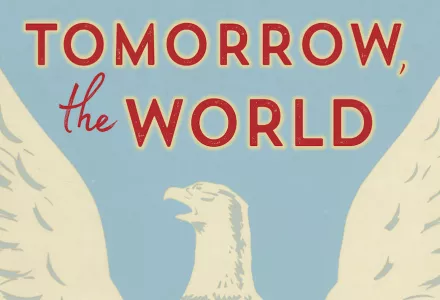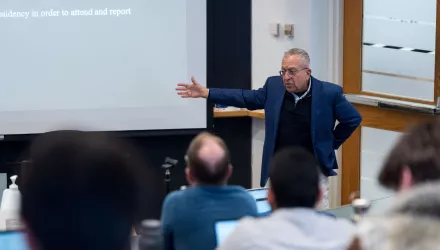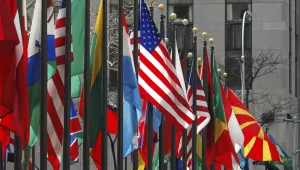For this session, the Applied History Working Group is delighted to welcome the eminent historian Paul Kennedy, the J. Richardson Dilworth Professor of History at Yale, and Stephen Wertheim, a renowned historian of U.S. foreign relations who directs grand strategy at the Quincy Institute for Responsible Statecraft.
Kennedy and Wertheim will discuss the latter's new book Tomorrow, the World: The Birth of U.S. Global Supremacy (Harvard University Press). Moderated by Graham T. Allison, these scholars will contextualize America's global role today, exploring how and why, as it prepared to enter World War II, the United States decided to lead the postwar world.
All HKS affiliates are welcome to attend; register using the RSVP link above.
Paul M. Kennedy is the J. Richardson Dilworth Professor of History and Distinguished Fellow of the Brady-Johnson Program in Grand Strategy at Yale University. He served as the Director of International Security Studies programs, funded by the Smith Richardson Foundation, from 1989 until 2017, and he is now the director of the maritime and naval studies initiative. He is internationally known for his writings and commentaries on global political, economic, and strategic issues. His best-known work is The Rise and Fall of the Great Powers, which provoked an intense debate upon its publication in 1988 and has been translated into over twenty languages.
Stephen Wertheim is a historian of the United States in the world. He directs grand strategy at the Quincy Institute for Responsible Statecraft, which he co-founded with a mission to move U.S. foreign policy away from endless war and toward vigorous diplomacy in the pursuit of peace. He is the author of Tomorrow, the World: The Birth of U.S. Global Supremacy (Harvard University Press, 2020) and academic articles on such topics as U.S. strategy, international law, world organization, and humanitarian intervention. He previously held faculty positions in the history departments of Columbia University and Birkbeck, University of London. He received a PhD in History from Columbia in 2015. In 2007, he received an AB summa cum laude in History from Harvard University, where his thesis adviser was Ernest May.
Harvard University Press on Tomorrow, the World:
For most of its history, the United States avoided making political and military commitments that would entangle it in European-style power politics. Then, suddenly, it conceived a new role for itself as the world's armed superpower—and never looked back. In Tomorrow, the World, Stephen Wertheim traces America's transformation to the crucible of World War II, especially in the months prior to the attack on Pearl Harbor. As the Nazis conquered France, the architects of the nation's new foreign policy came to believe that the United States ought to achieve primacy in international affairs forevermore.
Scholars have struggled to explain the decision to pursue global supremacy. Some deny that American elites made a willing choice, casting the United States as a reluctant power that sloughed off "isolationism" only after all potential competitors lay in ruins. Others contend that the United States had always coveted global dominance and realized its ambition at the first opportunity. Both views are wrong. As late as 1940, the small coterie of officials and experts who composed the U.S. foreign policy class either wanted British preeminence in global affairs to continue or hoped that no power would dominate. The war, however, swept away their assumptions, leading them to conclude that the United States should extend its form of law and order across the globe and back it at gunpoint. Wertheim argues that no one favored "isolationism"—a term introduced by advocates of armed supremacy in order to turn their own cause into the definition of a new "internationalism."
We now live, Wertheim warns, in the world that these men created. A sophisticated and impassioned narrative that questions the wisdom of U.S. supremacy, Tomorrow, the World reveals the intellectual path that brought us to today's global entanglements and endless wars.



